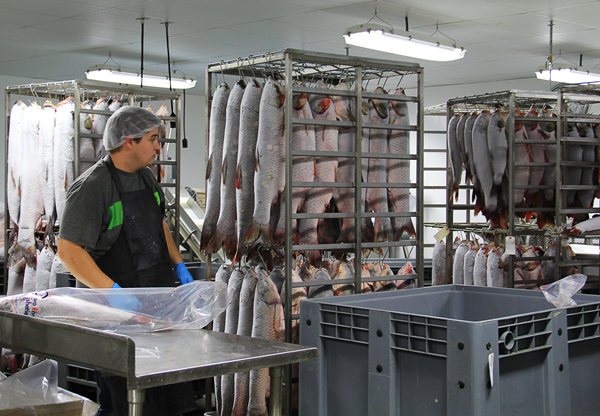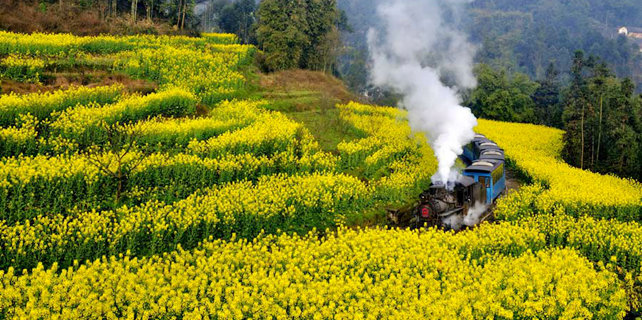Asian carp: from problem to profit
 |
|
Processed Asian carp are ready to be bagged for shipping at the Two Rivers Fisheries in Wickliffe, Kentucky. PROVIDED TO CHINA DAILY |
Fisheries in the American South imported Asian carp from China in the 1970s to clean their commercial ponds. However, Asian carp spilled into the freshwater system due to flooding.
Since then, Asian carp has become an environmental problem due to its ability to prodigiously reproduce and crowd out native spices, upsetting the ecological balance and harming the local fishing industry.
While hundreds of millions of dollars have been spent to fight Asian carp, Angie Yu, owner of Two Rivers Fisheries in Wickliffe, Kentucky, came up with an idea to make money instead of spending money in the battle against Asian carp – sell them and eat them.
Yu, a Chinese American from Los Angeles, first read about the Asian carp dilemma in 2010. At that time, she already had developed a business by exporting Iceland's lumpfish, discarded after roe was removed for consumption, to China.
"I thought to myself, Asian carp is very popular in China; people consider it very delicious. Yet here in the US, it's viewed as a disaster and something to be rid of. Why not export them to China?" Yu said.
After some research, Yu chose Wickliffe to run her business. "This is where the Ohio River and Mississippi River meet with Lake Barkley and Kentucky Lake nearby. There is ample Asian carp available, and the government wants to get rid of them, said Yu.
Wickliffe is a town of about 700 located in Ballard County, which has a population of roughly 8,000.
Yu had to overcome some obstacles: she never processed fish before and so she needed to build a processing facility. Nobody was catching Asian carp, and she needed to mobilize local fishermen.
"Most local fishers are on a part-time basis. They are also farmers. Since local people don't eat Asian carp, they never tried to catch them before. They had to learn how to catch Asian carp," said Yu.
A gill net is used to capture Asian carp, which often weigh more than 10 pounds and can weigh as much as 100. "It's common to see fish of 30 to 40 pounds," Yu said.
Two Rivers Fisheries was opened in July 2013. After receiving the fish from fishermen, employees process them into patties, tail, sausages, ribs or even dumplings. Then they are flash frozen and boxed for shipping.
Yu said now more than 30 teams of fishermen have registered with her company to supply Asian carp. However, each team consists of only two or three fishermen, and they capture fish only a couple of times every week, so the supply is insufficient.
To increase supply to meet the capacity of her processing facility and market demand, Yu began setting up her own full-time fishing team this year.
"We are starting with two fishing boats first and will go from there," she said.
Yu went into the business intending to export the Asian carp to China, but that had to change.
"First, Chinese consumers favor live fish instead of frozen fish; second, commercially raised carp is cheap there. Eventually most of our products are exported to European countries," Yu said, adding that she also is exploring opportunities to market the fish in the US.
Yu said most American consumers don't eat carp. However, that can be changed.
"We have a culinary kitchen at Two Rivers Fisheries. Our Chinese employees, sometimes our Chinese customers when they visit here, would cook up delicious dishes with carp and invite people to eat," Yu said.
This practice has changed some locals' views of Asian carp. "Now we have some local people coming to us to buy carp," Yu said.
Yu's business has been steadily growing since 2013. Capacity has increased from 1 million pounds in the first couple of years to 2 million pounds in 2016, and Yu expects it to double to 4 million pounds in 2017, with her own fishing boats in place.
Wang Licheng, a businessman in the animal protein and aquatic product trade from Dalian, China, was visiting Two Rivers Fisheries in early March to look for an investment opportunity.
"I find it interesting from a cultural perspective. Carp is popular with Chinese, yet viewed as a disaster in the US because they don't eat this kind of fish. These are wild-caught, better than those raised in farming ponds in China," Wang said.
Wang is optimistic about investing in the Asian carp-related business in the US. The abundance of wild-grown Asian carp can be used in many ways, he said.
Besides being processed into food, the leftovers can be turned into fish meal or fertilizers. The abundance means a sustainable business, and Wang wants to get involved, to make a profit out of an American problem, just like Yu does.
mayzhou@chinadailyusa.com
















